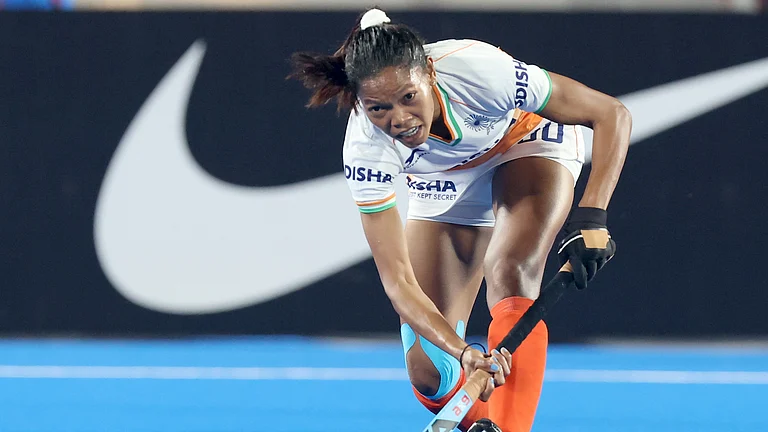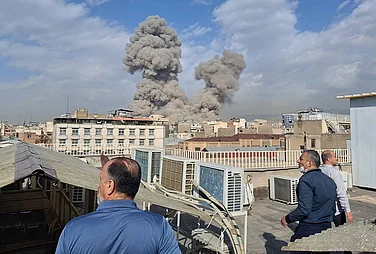The Iranian regime has banned an upcoming film festival in the country after a poster featured an actress without hijab, according to a report.
Women in Iran are required by law to cover their heads in public with Islamic head-covering known as hijab. The law was introduced after the Islamic Revolution of 1979 in Iran in which the conservative clergy took over the country after toppling the liberal, pro-West monarchy.
The decision to ban the film came directly from Iran's cultural minister Mohammad Mehdi Esmaili, according to the report. It was slated to be held in September.
The AFP news agency reported that Esmaili banned the upcoming 13th edition of the Iranian Short Film Association (ISFA) after a poster of the film 'The Death of Yazdguerd' (1982) showed actress Susan Taslimi without hijab.
"The culture minister has personally issued an order to ban the 13th edition of the ISFA Film Festival, after using a photo of a woman without a hijab on its poster in violation of the law," said Iran's state news agency IRNA, as per AFP.
Since September 2022, Iran has been rocked by protests —largely women-led— against the state imposition of hijab. These protests began after Mahsa Amini, a 22-year-old woman of Kurdish ethnicity, died in the custody of the Iranian morality police. She was taken into custody over an alleged violation of the hijab law when she was out with her brother. For months, protests raged across Iran that became the biggest challenge to the regime over the years. Though the large protests have now died, and the regime has introduced fresh measures to check defiance, individual acts of resistance continue.
In Iran's hijab protests, women often took off their hijabs, burnt them, and cut their hair publicly in defiance of the Iranian regime.
Women in Iran have been have been legally bound to wear hijab in public since 1983. Though, the hijab diktat was informally imposed in 1979 itself with the Islamic Revolution of 1979 overthrowing the liberal monarchy and establishing a conservative state under the Supreme Leader of Iran.
"The 1979 Islamic revolution introduced the idea of hijab law. On March 8 1979, thousands of Iranian women marched in the street, protesting the idea of imposing hijab with slogans such as 'freedom of choice in clothes'. Wearing hijab became obligatory for all Iranian women from April 1983. Since then, all women have been legally obliged to wear hijab in public, even non-Muslims and foreigners visiting Iran," notes Sahar Maranlou, Lecturer, School of Law, University of Essex, in an article in The Conversation.
In addition to wearing of hijab, women are also required to not wear form-fitting or revealing clothes and the mingling of opposite genders in public is also regulated.
Since September 2022, hundreds of protesters have been killed and several high-profile personalities, including sportspersons and actors, have taken off hijabs in protests or expressed solidarity with the protesters in other ways. Just this Wednesday, prominent actress Afsaneh Bayegan received a suspended two-year prison sentence for failing to wear hijab at a public event, reported AFP, adding that Digikala, a major e-commerce company, is also facing legal actions over images of female employees not wearing hijab.
Other prominent Iranians who have defied the Iranian regime over the hijab rule are chess players Sara Khadem and Atousa Pourkashiyan, competitive climber Elnaz Rekabi, skater Niloufar Mardani, singer Shervin Hajipour, etc. A women's basketball team also released a photo without hijab with the slogan 'Women. Life. Freedom.' — the rallying cry for the Iranian hijab protests and women movement. For her act, Khadem had to move to Europe over safety reasons and Hajipour was awarded a Grammy Award for his song that became the unofficial anthem of the movement.
At the Cannes Film Festival in May, Iranian-American model Mahlagha Jaberi wore a dress with a noose-styled collar to bring attention to executions in Iran.
In a post on Instagram, Jaberi she said, "We wanted to make a fashion statement to observe the glamour of Cannes, but more importantly, to bring media attention to the wrongful executions of Iranian people. Unfortunately, political statements are not allowed at the film festival and the security stopped me from showing the back of my dress, but the 'noose' meaning was well understood."


























